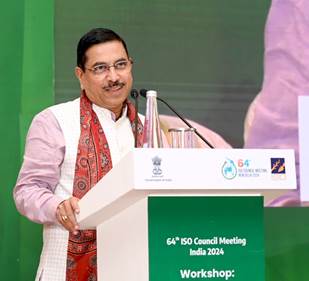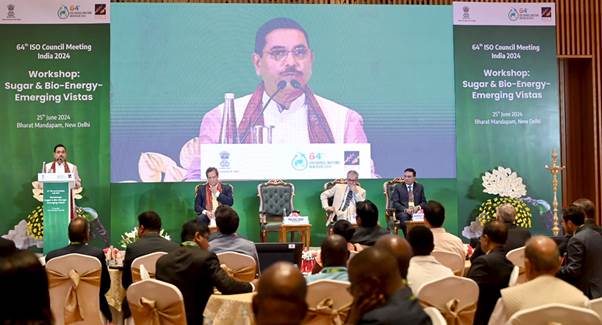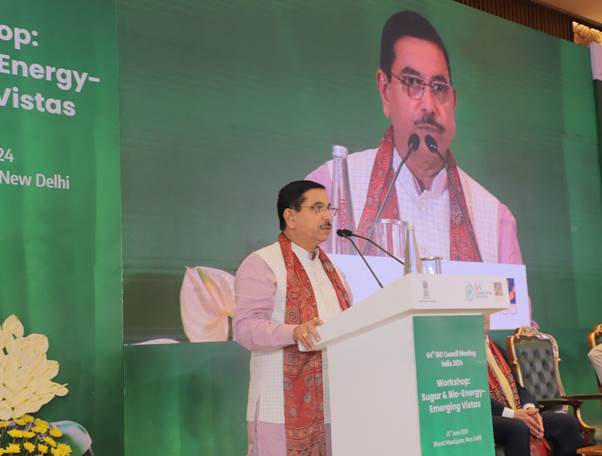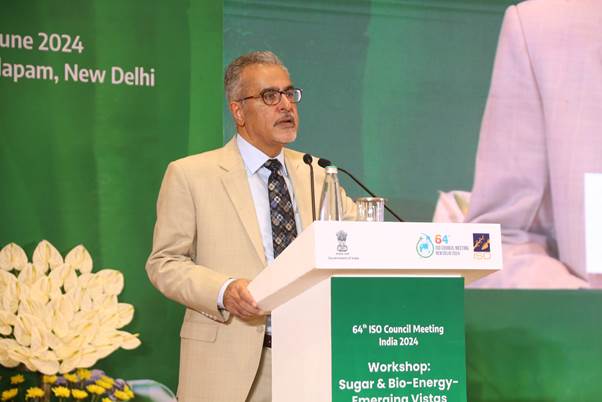Union Minister of Consumer Affairs, Food and Public Distribution and New and Renewable Energy, Shri Pralhad Joshi inaugurated 64th Council Meeting of the International Sugar Organization (ISO) at Bharat Mandapam here today. The meeting will conclude on 27th June, 2024. Experts from over 30 countries participated in the meeting to discuss and deliberate on the future possibilities, challenges, and strategies in the sugarcane, sugar, and allied sectors. Earlier, India hosted 41st session of ISO council Meeting in 2012.
Union Minister of Consumer Affairs, Food and Public Distribution and New and Renewable Energy, Shri Pralhad Joshi and other dignitaries lighting of the lamp
During his inaugural address, the Union Minister said nearly 5 crore farmers (Including Family Members) are engaged in cultivation of sugarcane and the industry is providing ample employment opportunities both directly and indirectly. He emphasised Government of India under the leadership of Hon’ble Prime Minister accords top priority to the welfare of farmers and safeguarding interest of consumers as well as the industry thereby, ensuring collaborative efforts to improve agricultural practices.
Shri Joshi expressed pride hosting the ISO conference and highlighted India’s commitment to advancing technology and skills in the sugar and biofuel sectors. Emphasizing India’s cultural and economic reliance on sugar, the Minister noted India’s status as the world’s largest sugar consumer and a significant biofuel producer, achieving over 12% ethanol blending with petrol and aiming for 20% soon.
The Minister underscored the role of biofuels in combating climate change and detailed the positive impacts of India’s Ethanol Blended with Petrol (EBP) Programme on the sugar industry and farmers. The Minister encouraged delegates to leverage this conference for future ventures in the sugar sector and wished for its success.

Shri Sanjeev Chopra, Secretary Department of Food & Public Distribution, Government of India and Chairman, ISO suggested the bigger role of ISO in times to come. He emphasized the urgent need for the global sugar and ethanol industry to tackle climate change through sustainable practices, including developing drought-resistant sugarcane, conserving water, and promoting biofuels. Further, the need for more collaboration amongst ISO member countries in using modern technology for their farmers, small players was also highlighted. India and Brazil both being top two sugar producing countries, shall collaborate and synchronised efforts should be made in research and development in sugarcane so that better varieties suitable for local conditions with higher yield and sucrose content may be developed. He also highlighted India’s strides in ethanol production and blending, underscoring the nation’s commitment to sustainability and encouraging international cooperation in these efforts. Shri Chopra highlighted the success of Global Biofuel Alliance, an initiative of Prime Minister of India.

Shri Jose Orive, ED, ISO congratulated India on handling the ISO matters as Chair successfully and organising the event in such a grand manner. He appreciated the synergy between Government of India and Indian sugar & biofuel industry which has played instrumental role in progress of India in this sector.
On the occasion, a workshop titled ‘Sugar & Bio-Energy – Emerging Vistas’ was held today. This workshop served as an excellent platform for industry leaders and government officers to exchange ideas and explore future prospects in the sugar and bio-energy sectors.

The workshop on ‘Sugar & Bio-Energy – Emerging Vistas’ included various insightful sessions such as:
- Sustainability through Diversification: The session focused on taking sugarcane farming and sugar sector towards more sustainable practices and key role played by Ethanol Blending Programme in this direction. Further, stronger Global Biofuel Alliance would facilitate more replacement of fossil fuel with green fuels.
- Mechanization & Modernization of the Sugar Sector: Taking the sustainability theme forward, sugarcane farming was at the core of deliberations during the session. Farm mechanization, customization of machinery for small land holdings like in India and extension services to farmers along with use of technology will make sugarcane cultivation more economical and productive.
- Digitization of the Sugar Sector: This session highlighted the various initiatives like AgriStack of Government of India which is revolutionizing agri-statistics and data management which is essential for more suitable policy formulation and timely government intervention. Use of AI/ML as well as remote sensing technologies for agri practices would be crucial for crop quality and productivity.
- Global Demand and Supply of Sugar: Mr. Peter de Klark, Economist of ISO and Dr. Claudiu Covrig shared their analysis of global sugar sector. Bringing clarity to demand and supply scenario in global sugar and ethanol sector in near future, this panel discussion showed the patterns of sugar trade and expectations on sugar prices in global market.
- Green Hydrogen: Mr. Lindsay Jolly, Consultant of ISO shared his perspective on potential of hydrogen as source of energy and role of sugar sector in this field. He was optimistic on growth of green hydrogen as major source of fuel for automobile sector as well as electricity sector.

The conference provided an excellent opportunity for delegates to interact with sector experts, understand global trends, and deliberate on various topics of relevance for sugar and ethanol. The sessions facilitated productive discussions and ensured a meaningful exchange of ideas, steering the conversations towards impactful outcomes. The conference underscored India’s commitment to fostering international collaboration and innovation in the sugar industry, paving the way for sustainable and advanced practices in the sector.




